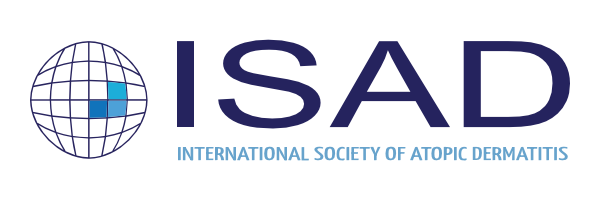The Christmas/New Year break is close, and in this annual review period, 2023 was a very productive year for the ISAD, with a peak activity this summer.
Dear Colleagues, Dear Friends,
On July 3rd at the Singapore WCD, we discussed “Global Aspects of AD” with an international expert panel and an audience representative of the diversity of our field. A derived JEADV position paper “AD: A Global Health Perspective” is now published. The Singapore roundtable was an opportunity to compare experiences in World Bank category 1 (Madagascar and Mali), 3 (Brazil, China), and 4 (Australia, Germany, Qatar, USA, Singapore, Japan) countries. The expert panel concluded that current AD guidelines are not adapted for low resource settings and that a more pragmatic approach, as developed by WHO for skin neglected diseases (NTDs), would be advisable for minimal access to moisturizers and topical corticosteroids. The panel also recommended prioritizing prevention studies, regardless of the level of existing resources. For disease long-term control in World Bank category 3 and most category 4 countries, the main identified problem was not access to drugs for most mild-to-moderate cases, but rather poor compliance due to insufficient time at visits.
Our annual meeting, the 13th Rajka symposium, was organized masterfully by Magdalena TRZECIAK and her team in Gdansk, Poland (31 Aug- 2 Sept) with the support of the Polish Society of Dermatology, under the motto “Solidarity in AD”. Solidarity was exemplified by current joint ISAD-WHO initiatives, including a pre-meeting discussing with the industry how to improve access to drugs. Diversity was also a reality with 396 participants of more than 43 countries (18% online) representing all regions of the world.
A regional ISAD meeting for Latin America was successfully held (Sept 29-30) in São Paulo under the leadership of Roberto TAKAOKA under the auspices of the Brazilian Atopic Dermatitis Association (ADA).
Research Fellowships 2023

Two research fellowships have been attributed in 2023. The awardees come from Chili (Javier ARELLANO) and Nigeria (Erere OTROFANOWEI) and will go respectively France and Switzerland. From 2024, applications will be accepted year long and a notification will be sent after a case-by-case review to applicants.
➜ Read more on the 2023 awardees and projects

What about our future activities?
- Our 14th Rajka symposium (Martin STEINHOFF, Doha, Qatar, 24-26 Oct. 2024) is underway, and a preliminary version of the program will be published in January.
- A spring live ISAD Global Virtual Symposium “Examining atopic dermatitis through the One Health concept” is scheduled on Wednesday 17 April CET time zone 3-7 PM, following -and enlarging the scope of- our 2021 symposium on Canine vs Human Symposium (link). Please have a look to the preliminary program (xxxx).
News on PubMed
A Japanese study published in Cell Reports by Sonoko Takahashi et al demonstrate with a conditional knockout mouse with a cell-type-specific deletion of IL-31RA that sensory neuronal STAT3 is essential for IL31 dependent itch. They also report that chronic itch of the MC903(calcipotriol)-induced dermatitis mouse model is strongly suppressed when sensory neurons are deficient in STAT3.
➜ DOI: 10.1016/j.celrep.2023.113433
A study from China by Wan-Ying Deng and colleagues published in Frontiers in Immunology, reports that a fecal transplant procedure with washed microbiota without associated medical intervention can improve AD, but this success is based on a single case report in an adolescent boy. However, fecal transplant is currently studied in several inflammatory chronic diseases and seems a promising approach.
Season’s greetings,
Alain TAÏEB
President ISAD


